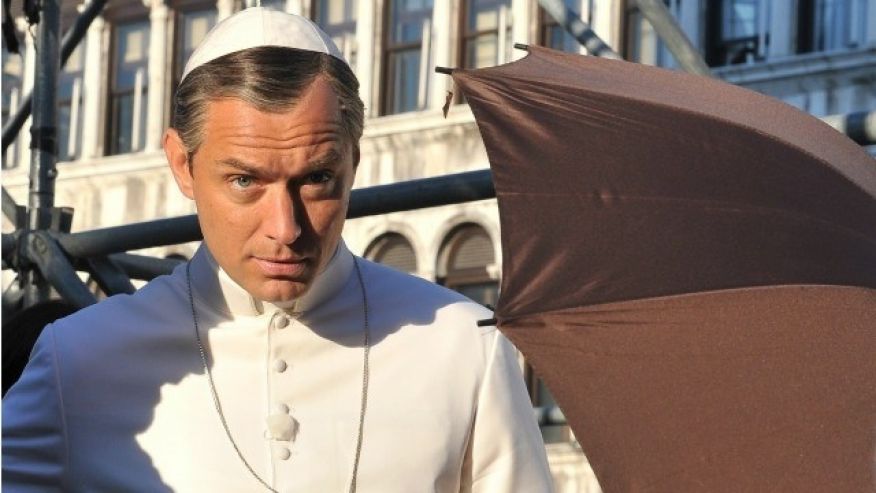
- Festivals
Seen in Venice: The Young Pope
The Venice festival has been at the forefront of recognizing serialized fiction as an emerging and integral part of the film making landscape. Two years ago Golden Globe nominated HBO miniseries Olive Kitteridge bowed at the Sala Darsena here, and this year the festival hosted the world premiere of the HBO/Canal+/Sky The Young Pope, directed by Golden Globe winning director Paolo Sorrentino, (La Grande Bellezza, Best Foreign Film – 2013).
Young Pope opens shortly following the election of brash young American prelate Lenny Belardo ( Golden Globe nominee Jude Law) as pope Pius XIII and from the dream-like opening sequence which moves through palatial Vatican rooms replete with priests, cardinals and nuns, we are in unmistakable Sorrentino country. The prelates are preparing for the pope’s homily – the address to the faithful in St. Peters square. When Pius finally makes his way to the balcony he begins with an exhortation to brotherly love but suddenly veers into an apology of “freedom” which includes sex, abortion gay marriage and happiness. Panic quickly shivers through the ranks as bishops blanch and mothers superiors faint…and the newly minted Pontiff suddenly awakes.
The speech may have been a dream but we find out soon enough that this is no ordinary pope. First we understand that his election was somewhat of a fluke, an unintended consequence of a conclave deal gone awry. The arrangement had been brokered to elect Cardinal Michael Spencer, Belardo’s mentor but somewhere it went wrong and the Vatican (and one billion Catholics) suddenly find themselves under the infallible stewardship of a ruthless and chain-smoking authoritarian with a penchant for power and the diet cherry coke he demands of the startled Vatican butler.
The state of affairs is particularly unsettling for Vatican Secretary of State Cardinal Voiello (Silvio Orlando). Orlando’s role seems a riff on the one Tony Servillo played in Sorrentino’s Il Divo, which was based on the legendarily scheming Italian arch-politician Giulio Andreotti. World-weary and ruthless as Richelieu, Voiello is a rabid fan of the Naples soccer team and the eminence grise of the Vatican, a political mastermind who proudly proclaims to have facilitated the publication of 18 books about himself (especially the ones who attack him since these “can make merely famous men into legends”).
To his great chagrin Voiello quickly learns that this American Pope will not be manipulated as easily as his predecessors into the protocols of the Curia (the bishop’s council akin to the Vatican parliament). Especially when Pius calls to his side Sister Mary, an American nun who we learn was his surrogate mother in the p orphanage where he grew up. Equally ambitious, Mary is elevated to his personal “special assistant” – a powerful ally in the conflict shaping between the iconoclastic Holy Father and the staid Roman power structure.
You could be forgiven at this point for envisioning a sort of House of Cards as directed by Federico Fellini (still Sorrentino’s main artistic mentor). But in this case his inspiration extends to the Italian “fanta-political” cinema of Elio Petri, Francesco Rosi and Mario Monicelli, territory which he had already explored with Il Divo. Young Pope relishes the clash of millenary tradition and pop cultural vernacular: it is not only the Pope’s taste in soft drinks that wreaks havoc in Vatican City but also the fact that he intends to stop all merchandising picturing his likeness. Those sales account for a large chunk of the Vatican budget but Pius espouses the theory of the mysterious rock-star. Citing Salinger, Kubrick and Banksy he intends to augment his fame through hiding his face.
There is a built in appeal for any film set on the backdrop of the mysterious inner workings of the Vatican with its unfathomable intrigue which seems a worthy real life counterpart to the palace plotting on Game of Thrones. In fact another Italian, Nanni Moretti had gone there in Habemus Papam (We Have a Pope, 2011) which featured Michel Piccoli as newly elected pope faced with a crisis of self doubt that leads him to an impromptu journey of discovery beyond the Vatican walls. That film’s success lay in humanizing one of the world’s most iconic figures as a common man overwhelmed by circumstance.
Sorrentino’s is clearly a more ambitious undertaking, one whose tone straddles political satire, comedy, theology and realistic thriller. The two hour pilot concludes with the Pope’s actual homily – his first St. Peter’s address turns out to be a screed in which he accuses the crowd of “not being worthy of him” before abruptly leaving the startled crowd – that dream was a premonition after all. Before the credits roll Cardinal Voiello asks preemptive forgiveness for the nefarious deeds he will be called upon doing in order to “save the church”. The stage is set seemingly for a political struggle of biblical proportions.
The Young Pope is clearly transposes Sorrentino’s authorial vision to the serial form. The way the director will chose to tell this story should make for fascinating viewing.